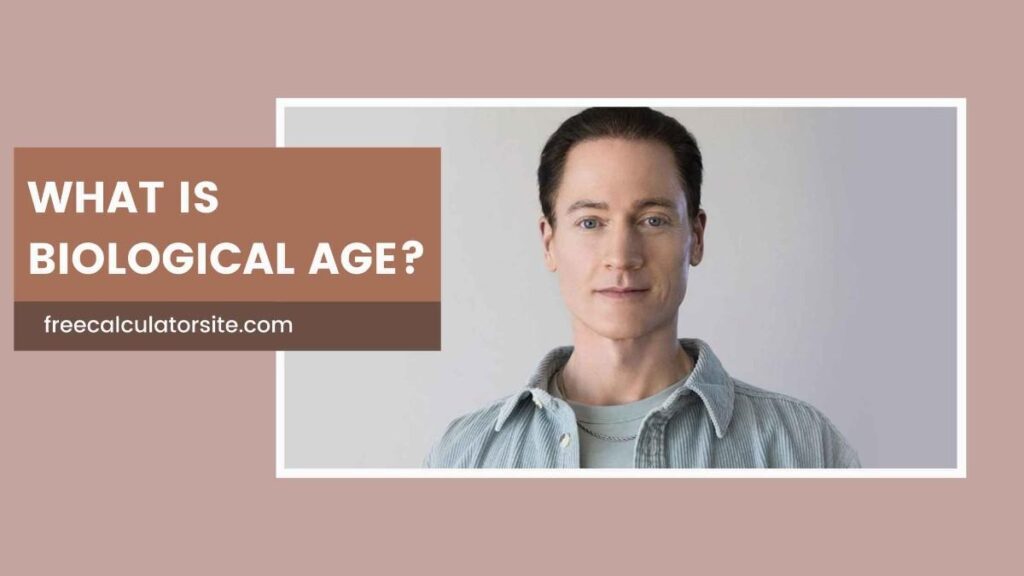Last updated on September 15th, 2024 at 08:16 pm

In the realm of health and wellness, chronological age often serves as a basic indicator of life stages and milestones.
However, there is another dimension of aging that may be more revealing when it comes to a person’s overall health and longevity—biological age.
Unlike chronological age, which is simply the number of years one has been alive, biological age reflects how well or poorly your body is aging, irrespective of the number of candles on your birthday cake.
Understanding biological age provides a deeper insight into your physical condition, health risks, and life expectancy.
So, what exactly is biological age, and why should you care about it?
The Concept of Biological Age
Biological age, also known as physiological age, refers to how old your body seems based on its biological processes.
It assesses the wear and tear on your organs, tissues, and cells, which can be affected by genetics, lifestyle choices, environment, and disease.
A person with a biological age lower than their chronological age is generally considered healthier, while someone with a higher biological age may be at greater risk for health problems.
While chronological age is fixed and objective, biological age can fluctuate depending on a variety of factors, including diet, exercise, stress, sleep, and more.
Therefore, it provides a more accurate representation of your health status than simply counting years.
How is Biological Age Calculated?
Biological age is not something you can easily calculate with simple math. Scientists and health experts use a combination of biomarkers—specific biological indicators that reflect the functioning of your body’s systems—to estimate biological age.
These biomarkers may include:
- Telomere Length: Telomeres are the protective caps at the ends of chromosomes. Each time a cell divides, these telomeres shorten. Shorter telomeres are associated with aging and age-related diseases.
- Epigenetic Changes: Epigenetics refers to changes in gene activity without altering the DNA sequence. Specific patterns of DNA methylation, a process that regulates gene expression, are associated with aging. Epigenetic clocks like the Horvath clock use this information to predict biological age.
- Organ Function: Tests assessing the functionality of organs, like lung capacity, heart function, or kidney efficiency, can give insights into how well your body is aging.
- Metabolic Rate: A slowing metabolism can be a sign of aging. Tracking metabolic changes, like insulin sensitivity and cholesterol levels, helps gauge biological age.
- Inflammation Markers: Chronic inflammation is a known driver of aging. High levels of inflammatory markers like C-reactive protein (CRP) can suggest accelerated aging.
These metrics can be collected through blood tests, imaging scans, physical exams, and even specialized genetic tests, all of which contribute to an overall estimate of biological age.
Biological Age vs. Chronological Age
Chronological age is simply the time that has passed since you were born, but biological age considers the cumulative damage and efficiency of your body’s systems.
These two ages don’t always match.
For example, you might be 45 years old according to your birth certificate, but if you’ve maintained a healthy lifestyle—eating nutrient-rich foods, exercising regularly, managing stress, and sleeping well—your biological age might be closer to that of a 35-year-old.
Conversely, someone with poor lifestyle habits, such as smoking, a sedentary lifestyle, and a diet high in processed foods, may have a biological age higher than their chronological one.
Also Read: Differences Between Chronological and Biological Age
Why Does Biological Age Matter?
The concept of biological age is important because it provides a more holistic view of health.
Knowing your biological age can motivate you to make lifestyle changes that can improve your longevity and quality of life. Here’s why it matters:
1. Better Predictor of Health Risks
Biological age is a more reliable indicator of how susceptible you are to age-related diseases like heart disease, diabetes, dementia, and cancer.
A higher biological age signals that your body may be more vulnerable to these conditions, even if your chronological age suggests you are “too young” to worry.
2. Personalized Health Interventions
If your biological age is higher than your chronological age, it’s a red flag that your lifestyle choices, environment, or genetics may be accelerating aging.
This knowledge can guide you to make personalized health interventions to slow down the aging process.
Whether it’s quitting smoking, reducing stress, or improving your diet, lowering your biological age is achievable.
3. Tracking Progress
Tracking biological age over time offers a tangible way to measure the effectiveness of lifestyle changes or medical treatments.
Imagine working out regularly, eating better, and seeing not just weight loss but also a reduction in your biological age—it’s a powerful motivator.
4. Improved Quality of Life
While no one can stop the hands of time, reducing your biological age can enhance your quality of life in your later years.
A lower biological age is associated with better mobility, cognitive function, and overall well-being.
It’s not just about living longer but living better.
Factors That Influence Biological Age
The good news is that while some factors like genetics are out of your control, many of the influences on biological age are modifiable.
Here are some key lifestyle factors that can significantly impact your biological age:
- Diet: A diet rich in whole foods like vegetables, fruits, lean proteins, and healthy fats can support cellular health and reduce inflammation, helping you age more slowly. Antioxidants found in foods like berries, green tea, and dark chocolate fight oxidative stress, one of the key drivers of aging.
- Exercise: Regular physical activity keeps your heart, muscles, and brain healthy. Aerobic exercise improves cardiovascular health, while strength training enhances muscle mass and bone density—both of which help lower biological age.
- Sleep: Quality sleep is essential for cellular repair and the proper functioning of your body’s systems. Inadequate or disrupted sleep accelerates the aging process, leading to a higher biological age.
- Stress Management: Chronic stress contributes to accelerated aging through mechanisms like hormonal imbalance, inflammation, and oxidative stress. Mindfulness practices, yoga, and breathing exercises are effective ways to manage stress and support a healthier biological age.
- Avoiding Toxins: Smoking, excessive alcohol consumption, and exposure to environmental toxins (like pollution or harmful chemicals) can wreak havoc on your cells and DNA, increasing your biological age. Avoiding or minimizing these factors can protect your body from unnecessary wear and tear.
Can You Reverse Your Biological Age?
While reversing aging entirely is still the stuff of science fiction, reducing biological age is very much within reach.
Research shows that adopting healthy lifestyle changes can lower biological age markers, potentially slowing the aging process or even reversing some aspects of it.
For instance, studies have found that regular exercise and a healthy diet can lengthen telomeres, effectively reducing biological age.
Epigenetic research suggests that targeted interventions, including caloric restriction and certain medications, might help reset some of the body’s aging processes.
Conclusion
Biological age offers a more nuanced view of how we are aging, transcending the limitations of chronological age.
By understanding your biological age and the factors that influence it, you can take proactive steps to not only live longer but also enjoy a higher quality of life.
The secret to aging well lies not in stopping time but in ensuring that your body ages gracefully and remains healthy for as long as possible.
So, are you ready to embrace your biological age and take charge of your health journey?

Akash Singh is a finance enthusiast who shares valuable insights on various calculators.
